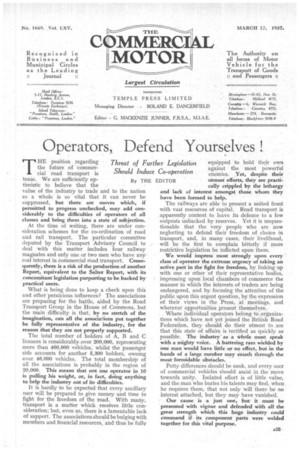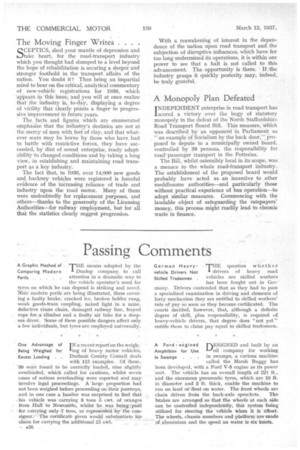Operators, Defend Yourselves !
Page 27

Page 28

If you've noticed an error in this article please click here to report it so we can fix it.
THE position regarding Threat of Furl the future of commercial road transport is Should Induce tense. We are sufficiently opBy THE tirnistic to believe that the value of the industry to trade and to the nation as a whole is so vital that it can never be suppressed, but there are moves which, if permitted to progress unchecked, may add considerably to the difficulties of operators of all classes and bring them into a state of subjection.
At the time of waiting, there are under consideration schemes for the co-ordination of road and rail transport. The particular committee deputed by the Transport Advisory Council to deal with this matter includes four railway magnates and only one or two men who have any real interest in commercial road transport. Consequently, there is a risk of the production of another Report, equivalent to the Salter Report, with its concomitant legislation purporting to be backed by practical users.
What is being done to keep a check upon this and other pernicious influences? The associations are preparing for the battle, aided by the Road Transport Group in the House of Commons, but the main difficulty is that, by no stretch of the imagination, can all the associations put together be fully representative of the industry, for the reason that they are not properly supported.
The total number of holders of A, B and C licences is considerably over 200,000, representing more than 460,000 vehicles, whilst the passenger side accounts for another 5,300 holders, owning over 46,000 vehicles. The total membership of all the associations is probably in the region of 20,000. This means that not one operator in 10 is pulling his weight, or, in fact, doing anything to help the industry out of its difficulties.
It is hardly to be expected that every ancillary user will be prepared to give money and time to fight for the freedom of the road. With many, transport is a matter which receives little consideration; but, even so, there is a lamentable lack of support. The associations should be bulging with members and financial resources, and thus be fully her Legislation equipped to hold their own Co-operation enemies. .Yet, despite their EDITOR utmost efforts, they are practi cally crippled by the lethargy and lack of interest amongst those whom they have been formed to help.
The railways are able to present a united front with vast resources of capital. Road transport is apparently content to leave its defence to a few outposts unbacked by reserves. Yet it is unquestionable that the very people who are now neglecting to defend their freedom of choice in transport, and, in many cases, their livelihood, will be the first to complain bitterly if more restrictive legislation be inflicted upon them.
We would impress most strongly upon every class of operator the extreme urgency of taking an active part in the fight for freedom, by linking up with one or other of their representative bodies, impressing upon local chambers of commerce the manner in which the interests of traders are being endangered, and by focusing the attention of the public upon this urgent question, by the expression of their views in the Press, at meetings, and wherever opportunities present themselves.
Where individual operators belong to organiza tions which have not yet joined the British Road Federation, they should do their utmost to see that this state of affairs is rectified as quickly as possible. The industry' as a Whole must speak with a mighty voice. A battering ram wielded by one man would have little or no effect, but in the hands of a large number may sniash through the most 'formidable obstacles.
Petty differences should be sunk, and every user of commercial vehicles should assist in the move towards unity. Isolated effort is of little value, and the man who buries his talents may find, when he requires them, that not only 'will there be no interest attached, but they may have vanished.
Our cause is a just one, but it must be presented with vigour and defended with all the great strength which this huge industry could command if its component parts were welded together for this vital purpose.
The Moving Finger Writes .
SCEPTICS, shed your mantle of depression and take heart, for the road-transport industry which you thought had slumped to a level beyond the hope of rehabilitation is securing a deeper and stronger foothold in the transport affairs of the nation. You doubt it? Then bring an impartial mind to bear on the critical, analytical commentary of new-vehicle registrations for 1936, which aPpeats in 'this issue, and you will at once realize that the induslry is,. to-day, displaying a degree of virility that clearly Points a finger to progressive improvement in future years.
• The facts and figure§ which are enumerated emphasize that the industry's destinies are not at the mercy of men with feet of clay, and that whatever scars may be borne by those who have had to battle with restrictive forces, they have succeeded, by dint of sound enterprise, ready adaptability to changed conditions and by taking a long view, in establishing and maintaining road transport as a key industry.
The fact that, in 1936, over 14,000 new goods and hackney vehicles were registered is forceful evidence of the increasing reliance of trade and industry upon the road motor. Many of them were undoubtedly for replacement purposes, and others—thanks to the generosity of the Licensing Authorities—for railway employment, but for all that the statistics clearly suggest progression. With a reawakening of interest in the dependence of the nation upon road transport and the subjection of disruptive influences, which have for too long undermined its operations, it is within our power to see that a halt is not called •to this advancement. The opportunity is there. If the industry grasps it quickly posterity may, indeed, be truly grateful.
A Monopoly Plan Defeated
INDEPENDENT enterprise in road transport has Iscored a Victory over the bogy of statutory monopoly in the defeat of the North Staffordshire Road Transport Board Bill. This measure, Which was described by an opponent in Parliament as " an example of Socialism by the back door," Proposed to depute to a municipally owned board', controlled by 39 persons, the responsibility for road' passenger transport in the Potteries.
The Bill, whilst ostensibly local in its scope, was a menace to the whole road-transport industry. The establishment of the proposed board would probably have acted as an incentive to other meddlesome authorities—and particularly those without practical experience of bus operation—to adopt similar measures. Commencing with the laudable object of safeguarding the ratepayers' money, this process might readily lead to chronic waste in finance.




















































































